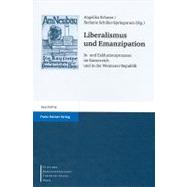- ISBN: 9783515093194 | 3515093192
- Cover: Hardcover
- Copyright: 7/13/2010
English summary: Emancipation has always been one of the key demands of liberalism. Its followers sought the liberation of all citizens of traditional bonds, to create a society based on the freedom and equality of its citizens. But how did the liberals react in the Empire and the Weimar Republic when it actually came to implementing the political and legal equality of women and Jews? Profiled experts in Jewish history and in women's and gender history answer this question from different perspectives.They review inclusion and exclusion mechanisms amongst liberals at the local and regional level in Germany and place them in an international context. They focus on a number of personalities that stand out, but also analyze the liberal movement as a whole. It is clear that anti-Semitic and anti-feminist sentiments were also found in liberalism, even though many women and Jews placed the hopes of their struggle for participation in this movement. German text. German description: Emanzipation war seit jeher eine der zentralen Forderungen des Liberalismus. Seine Anhanger erstrebten die Befreiung aller Burger von uberkommenen Fesseln, um eine auf Freiheit und Gleichheit beruhende Staatsburgergesellschaft zu schaffen. Doch wie reagierten die Liberalen, als es im Kaiserreich und in der Weimarer Republik konkret darum ging, die politische und rechtliche Gleichstellung von Frauen und Juden in die Tat umzusetzen? Profilierte Experten der judischen Geschichte und der Frauen- und Geschlechtergeschichte beantworten diese Frage aus verschiedenen Blickrichtungen. Sie nehmen Ein- und Ausschlussmechanismen unter Liberalen auf lokaler und regionaler Ebene in Deutschland in den Blick und stellen sie in den internationalen Kontext. Sie widmen sich einzelnen herausragenden Personlichkeiten, analysieren aber auch die liberale Bewegung als Ganzes. Dabei wird deutlich, dass antisemitische und antifeministische Ressentiments auch im Liberalismus zu finden waren, obwohl zahlreiche Frauen und Juden bei ihrem Kampf um Partizipation gerade auf diese Bewegung ihre Hoffnungen setzten.







